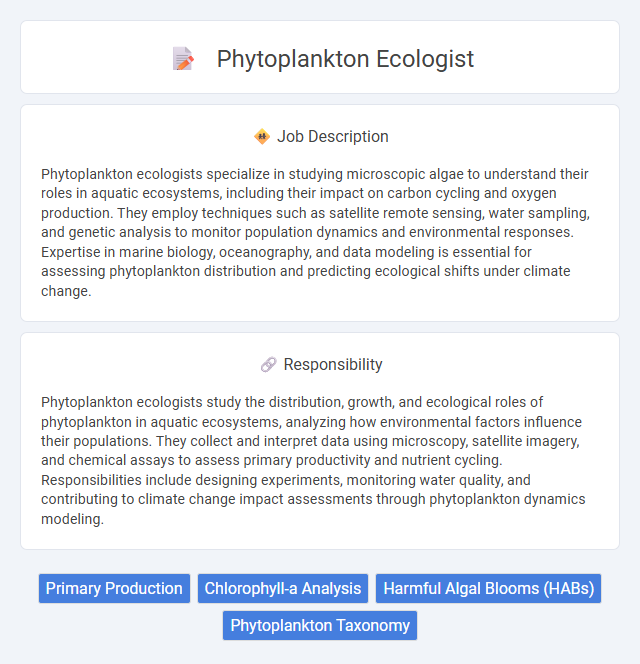
Phytoplankton ecologists specialize in studying microscopic algae to understand their roles in aquatic ecosystems, including their impact on carbon cycling and oxygen production. They employ techniques such as satellite remote sensing, water sampling, and genetic analysis to monitor population dynamics and environmental responses. Expertise in marine biology, oceanography, and data modeling is essential for assessing phytoplankton distribution and predicting ecological shifts under climate change.
Individuals with a strong curiosity for marine ecosystems and a background in biological sciences will likely find a career as a Phytoplankton Ecologist suitable. Those who are comfortable with fieldwork, data analysis, and spending extended periods in outdoor or aquatic environments may have a higher probability of thriving in this role. Candidates possessing patience, attention to detail, and the ability to work both independently and collaboratively could be better aligned with the demands of this profession.
Qualification
A Phytoplankton Ecologist requires a strong background in marine biology, ecology, or environmental science, typically supported by a master's or PhD degree. Proficiency in microscopy, flow cytometry, and molecular techniques for identifying and quantifying phytoplankton species is essential. Experience with data analysis software, field sampling methods, and oceanographic instrumentation enhances effectiveness in monitoring phytoplankton populations and understanding their ecological roles.
Responsibility
Phytoplankton ecologists study the distribution, growth, and ecological roles of phytoplankton in aquatic ecosystems, analyzing how environmental factors influence their populations. They collect and interpret data using microscopy, satellite imagery, and chemical assays to assess primary productivity and nutrient cycling. Responsibilities include designing experiments, monitoring water quality, and contributing to climate change impact assessments through phytoplankton dynamics modeling.
Benefit
Phytoplankton ecologists likely gain valuable insights into aquatic ecosystems that enhance environmental conservation efforts. Their expertise probably contributes to predicting climate change impacts, benefiting global ecological health. Such roles may offer opportunities to influence sustainable resource management and marine biodiversity preservation.
Challenge
Phytoplankton ecologist roles likely involve significant challenges related to analyzing complex aquatic ecosystems and understanding variable environmental factors affecting phytoplankton populations. The job may require managing extensive data sets and employing advanced modeling techniques to predict ecological responses to climate change. Navigating the interdisciplinary nature of marine biology, chemistry, and environmental science could also present ongoing difficulties in achieving accurate and actionable research outcomes.
Career Advancement
Phytoplankton ecologists enhance their career by gaining expertise in marine biology, oceanography, and climate science, often pursuing advanced degrees such as a Master's or Ph.D. Specializing in areas like harmful algal blooms or carbon cycling offers opportunities for leadership roles in research institutions or environmental agencies. Publishing scientific papers and securing research grants are critical for upward mobility within academia or policy development sectors focused on aquatic ecosystems.
Key Terms
Primary Production
Phytoplankton ecologists specialize in studying the role of phytoplankton in aquatic ecosystems, particularly their contribution to primary production through photosynthesis. They analyze factors affecting phytoplankton growth, such as light availability, nutrient levels, and temperature, to understand carbon cycling and energy flow in marine and freshwater environments. Expertise in remote sensing, water sampling, and data modeling supports their research on ecosystem productivity and climate change impacts.
Chlorophyll-a Analysis
Phytoplankton ecologists specializing in chlorophyll-a analysis employ advanced spectrophotometric and fluorometric techniques to quantify chlorophyll concentrations, which serve as key indicators of primary productivity in aquatic ecosystems. These scientists interpret chlorophyll-a data to assess algal biomass, monitor water quality, and track ecological responses to environmental changes such as nutrient loading and climate variability. Proficiency in chromatographic methods, remote sensing applications, and data modeling enhances their ability to support marine conservation and resource management efforts.
Harmful Algal Blooms (HABs)
Phytoplankton ecologists specializing in Harmful Algal Blooms (HABs) analyze the growth patterns and environmental triggers of toxic algae species that disrupt marine ecosystems and pose health risks. They employ satellite data, water sampling, and molecular techniques to monitor bloom development and predict outbreak occurrences. Their research informs mitigation strategies and policy decisions to safeguard fisheries, water quality, and public health from HAB-related impacts.
Phytoplankton Taxonomy
Phytoplankton ecologists specializing in taxonomy identify and classify diverse phytoplankton species to understand aquatic ecosystem dynamics and their role in carbon cycling. Expertise in microscopy techniques and molecular analysis, including DNA barcoding, is essential to accurately differentiate species and monitor phytoplankton community composition. Knowledge of environmental factors influencing phytoplankton distribution supports ecological modeling and the assessment of water quality and climate change impacts.
 kuljobs.com
kuljobs.com